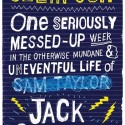An Interview with Tom Clempson!

I managed to nab Tom Clempson, author of the hilarous One Seriously Messed Up Week in the Otherwise Mundane and Uneventful Life of Jack Samsonite (what a title! Link goes to the review!) for an interview. One Seriously Messed Up Week is publishing on the 2nd May, so look out for it! I’d like to thank Tom for participating! (He can be a-followed on Twitter: @TomClempson)
ThirstforFiction: Jack Samsonite is pretty crude at times- were there any things that had to be cut because they were too crude?
Tom Clempson: Nothing that was too crude, but I did end up cutting out quite a few ‘F’ words. I also wanted to make sure that, whilst staying true to the way teen boys talk to each other in that tongue-in-cheek homophobic manner, the book didn’t come across as being homophobic or offensive itself. It was important that, as a book that has quite a prominent anti-bullying theme, it wasn’t being hypocritical. So that was constantly being tweaked.
T4F: How the hell can you replicate the voice of a modern teenage guy so well? Did you have a partner in crime (ie a nephew?)
Tom: Sadly, no. It was all me, but thank you for the compliment! I did pick the brains of my teenage brother-in-law and sisters-in-law for details on current trends, but nothing more. One of my first decisions in writing a teen was to not try to force the language. I’m sick of reading stereotypical teens as seen through the eyes of adults, where everyone speaks like ‘OMG, that’s like, SO ten-billion years ago!’ In actual fact, the majority of teens surprisingly speak like regular human beings! (with maybe a bit more attitude).
And despite everyone thinking that kids today aren’t like they used to be, I think that just shows what short and selective memories people have. Even sixteen year olds will take a look at Year 7s and go ‘we weren’t that small and cheeky when we were that age!’ Of course they were, it just looks different through older eyes.
So, with those points in mind it made sense to just use my own memories of being a teenager as the main basis of reference. I spent weeks regressing back into a teenager. It was kind of like how a method actor prepares for a role. I listened to all the old albums that I listened to as a school boy and just sat for hours at a time remembering what it was like to be in teenage skin and all the issues that went with that – confidence problems, fitting in, relationships, peer pressure, bullying, exams, puberty – all things that seem to be timeless teen turmoil. This was all helped by the fact that I still have the mental age of a child.
T4F: There may be a disclaimer on the publishing infomation page about how none of the characters are based on real people, but I don’t believe you. So spill the beans!
Tom: Not a single character is based on one person from real life. But all of the characters are based on lots of people from real life. That makes no sense. I should probably explain. No offence to my friends, but, I’m not sure I know anyone interesting/well enough to put in a book. But lots of the characters were inspired by multiple people I know/have known/have met/have overheard on a bus/have overheard other people talking about, all rolled into one. I really wanted a lot of the characters in the book to be recognisable, universal personalities, almost stereotypes, that made readers react by saying ‘I know someone just like this!’ (in favour of ‘I’ve read other characters just like this’ – which is tricky when your talking about stereotypes).
There is a lot of me in Jack, in that he lives in the house I grew up in, he rides on my old school bus, he goes to my old school, he loves films, and doesn’t seem to fit into any particular social category. But that is where most of the similarities end. Jack isn’t me (although most people assume he is), he simply shares a lot of my geographical history because I was lazy and nostalgic in my writing – I didn’t want to have to design a whole new school inside my head, when I knew a perfectly suitable one from memory. One that I was excited to revisit, that helped stir old memories of what it was like to be fifteen.
So, basically, one character could be a combination of six real people blended with a fictional soul and body. I don’t know if I could ever create an entire character that wasn’t at least partly inspired by someone from real life, intentionally or not. I hope these characters ring true and that people believe that they could be real, I just hope my old school friends don’t think that its them! That would be horrible.
T4F: What made you want to write a YA diary-style novel?
Tom: Freedom. Complete and absolute freedom. I totally lost myself in someone who was totally lost himself, and Jack just blindly took me on an adventure. It didn’t mater what I wrote or how I wrote it, because it was all Jack. If he wants to talk about something embarrassing, then that’s what I write. If he doesn’t know how to spell it, then that’s what I write. If nothing is happening, then that’s what I write.
I had just finished writing a manuscript that was a really long and arduous task, and at the end of it I knew it wasn’t right, and I knew I was competing with the worlds best fantasy adventure authors and that I didn’t stand a chance against their expertise.
So I thought, ‘screw expertise. I’m just going to write for the love of writing. I’m not going to try. I’m not going to write for a target readership. I’m just going to write whatever I feel like writing.’ And it was one of the most enjoyable things I have ever done in my life.
T4F: How long did it take you to right One Seriously Messed Up Week, and how did it all begin?
Tom: I think I just accidentally answered some of that question in my last answer. Sorry! But the first draft took me just over 2 weeks to finish. I don’t know how. And I’m fairly certain I’ll never be able to get anywhere near that again, especially as I was working a full time job and doing most of my writing on my way to and from work. The whole thing was a bit of a blur. I spent so long preparing it, yet zero time planning it. I didn’t know what I was going to write, except I knew I wanted to capture that feeling of being in school. I was insanely excited about doing it, and as soon as I started I could barely stop. I had gone from writing 8 pages a day on my previous manuscript, to writing 25 a day on One Seriously Messed-up Week. I was writing with pen and paper and my fingers could barely keep up with my brain, which made it really difficult to work out what the hell I had written when it came time to re-reading it!
That first draft was by no means a finished product though. I shelved it for about 6 months so that, when I went back to it, I could see it through fresh eyes. And when I did go back to it I enjoyed it as much as I had done writing it. That’s when I knew I had something that had a chance of not spending eternity in a cardboard box. The 6 month break also gave me a fresh perspective on things and made it really easy to spot what needed to be changed. I spent about another 6 months typing and editing as I went, then started researching agents.
T4F: Did you expect One Seriously Messed Up Week to be published?
Tom: Not when I was writing it. Not a chance. What I was writing felt so wrong, especially for the type of readership that it would be aimed at. I was genuinely just writing it for fun. But when I re-read it, I remember saying to my wife ‘this is actually quite good!’ I thought that it could be published, by a tiny independent publisher who didn’t mind taking a gamble, but I knew the chances were very slim even of that.
T4F: Are there going to be any sequels?…
Tom: If this one does well enough to warrant a return, then I’d jump at the chance. I am writing a sequel right now, purely because I can’t help myself. But there is no deal lined up so far.
T4F: And finally, what is the most enjoyable part of writing a novel?
Tom: Getting to choose what happens next. I usually write without a structured plan, so generally don’t know where I’m going from one chapter to the next. That excites me. It almost makes me feel like I am the reader, but instead of being taken on the journey, I get to drive it.




